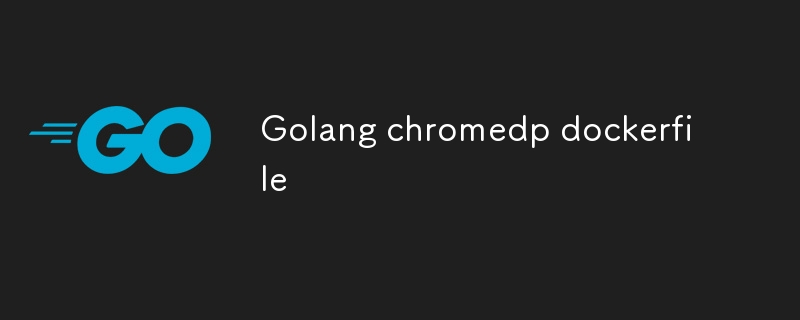

Dans le développement de logiciels modernes, Docker est devenu un outil indispensable, qui peut aider les développeurs à créer, déployer et gérer rapidement des applications. En tant que langage de programmation efficace et concis, Golang est également privilégié par les développeurs. Alors, comment développer des applications en utilisant Golang dans Docker ? Cet article explique comment écrire un Dockerfile pour une application Golang et utiliser la bibliothèque chromedp pour implémenter des tests Web automatisés. Si vous êtes intéressé par les tests automatisés Golang, Docker et Web, vous souhaiterez peut-être continuer à lire.
J'ai un code Golang qui utilise chromedp pour se connecter au chrome local de l'utilisateur Voici mon code :
package main
import (
"context"
"fmt"
"log"
"os"
"time"
"github.com/chromedp/chromedp"
"github.com/gin-gonic/gin"
)
func main() {
api := gin.default()
api.get("api/jwt", func(c *gin.context) {
opts := append(chromedp.defaultexecallocatoroptions[:],
chromedp.flag("headless", false),
chromedp.flag("disable-gpu", true),
chromedp.flag("no-sandbox", true),
chromedp.flag("disable-dev-shm-usage", true),
chromedp.flag("disable-browser-side-navigation", true),
chromedp.flag("disable-infobars", true),
chromedp.flag("disable-extensions", true),
chromedp.flag("disable-notifications", true),
chromedp.flag("disable-default-apps", true),
chromedp.flag("disable-background-timer-throttling", true),
chromedp.flag("disable-backgrounding-occluded-windows", true),
chromedp.flag("disable-renderer-backgrounding", true),
)
allocctx, cancel := chromedp.newexecallocator(context.background(), opts...)
defer cancel()
ctx, cancel := chromedp.newcontext(allocctx)
defer cancel()
var localstoragedata string // declaração da variável localstoragedata
err := chromedp.run(ctx,
chromedp.navigate("https://csonlinetenant.b2clogin.com/csonlinetenant.onmicrosoft.com/oauth2/v2.0/authorize"),
chromedp.sleep(5*time.second),
chromedp.waitvisible(`#fgh`),
chromedp.sendkeys(`#fghfg`, "fghfgh"),
chromedp.sendkeys(`#xcvxcv`, "xcxcvcxv"),
chromedp.click(`#thgh`, chromedp.byid),
chromedp.sleep(5*time.second),
chromedp.click(`dfgd`, chromedp.byid),
chromedp.sleep(15*time.second),
chromedp.evaluateasdevtools(`localstorage.getitem('c')`, &localstoragedata),
)
if err != nil {
log.printf("error: %v", err)
return
}
fmt.println("bearer", localstoragedata)
// restante do código...
c.json(200, gin.h{
"success": localstoragedata,
})
})
listenaddr := os.getenv("listen")
if val, ok := os.lookupenv("functions_customhandler_port"); ok {
listenaddr = ":" + val
}
if listenaddr == "" {
listenaddr = ":8080"
}
api.run(listenaddr)
}J'ai donc créé un fichier docker avec ce dont mon client a besoin pour utiliser cette application (j'ai installé Chrome et construit mon golang dans l'image)
fichier docker :
from golang:1.20 as build-stage
workdir /app
# instale as dependências do chrome
run wget -q -o - https://dl-ssl.google.com/linux/linux_signing_key.pub | apt-key add - \
&& echo "deb http://dl.google.com/linux/chrome/deb/ stable main" >> /etc/apt/sources.list.d/google.list
run apt-get update && apt-get -y install google-chrome-stable
run chrome &
copy go.mod go.sum ./
run go mod download
copy *.go ./
run cgo_enabled=0 goos=linux go build -o /dockergo
# run the tests in the container
from build-stage as run-test-stage
run go test -v ./...
# deploy the application binary into a lean image
from gcr.io/distroless/base-debian11 as build-release-stage
workdir /
copy --from=build-stage /dockergo /dockergo
expose 8080
user nonroot:nonroot
entrypoint ["/dockergo"]
Image construite avec succès et sans maux de tête Mais lorsque je teste l'image Docker localement, j'obtiens cette erreur :
Error: exec: "google-chrome": executable file not found in $PATH
Que signifie cette erreur ? Mon Chrome ne fonctionne pas ? Comment puis-je l'exécuter ?
Le navigateur Chrome est uniquement installé et n'est pas disponible dans l'image finale créée build-stage中。它在 build-release-stage.
J'essaie d'installer Chrome en utilisant ce fichier docker :
# deploy the application binary into a lean image
from gcr.io/distroless/base-debian11 as build-release-stage
run wget -q -o - https://dl-ssl.google.com/linux/linux_signing_key.pub | apt-key add - \
&& echo "deb http://dl.google.com/linux/chrome/deb/ stable main" >> /etc/apt/sources.list.d/google.list
run apt-get update && apt-get -y install google-chrome-stable
run chrome &Mais cela échoue avec le message suivant :
... step 2/4 : run wget -q -o - https://dl-ssl.google.com/linux/linux_signing_key.pub | apt-key add - && echo "deb http://dl.google.com/linux/chrome/deb/ stable main" >> /etc/apt/sources.list.d/google.list ---> running in 7596202a5684 failed to create shim task: oci runtime create failed: runc create failed: unable to start container process: exec: "/bin/sh": stat /bin/sh: no such file or directory: unknown
Je pense que vous devez choisir une autre image de base sur laquelle vous pouvez facilement installer Chrome. Une meilleure option consiste à exécuter les tests en utilisant l'image chromedp/headless-shell 作为基础镜像。该图像包含 chrome 的无头 shell,该 shell 非常小。下面的演示 dockerfile 还显示了首先编译测试二进制文件,然后在 chromedp/headless-shell :
FROM golang:1.20.5-buster AS build-stage WORKDIR /app COPY go.mod go.sum ./ RUN go mod download COPY . . RUN CGO_ENABLED=0 go build -o dockergo # Build the test binary RUN CGO_ENABLED=0 go test -c -o dockergo.test # Run the tests in the container FROM chromedp/headless-shell:114.0.5735.199 AS run-test-stage WORKDIR /app # Copy other files that is needed to run the test (testdata?). COPY . . COPY --from=build-stage /app/dockergo.test ./dockergo.test RUN /app/dockergo.test -test.v # Deploy the application binary into a lean image FROM chromedp/headless-shell:114.0.5735.199 AS build-release-stage COPY --from=build-stage /app/dockergo /dockergo EXPOSE 8080 ENTRYPOINT ["/dockergo"]
Ce qui précède est le contenu détaillé de. pour plus d'informations, suivez d'autres articles connexes sur le site Web de PHP en chinois!